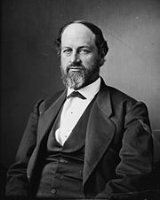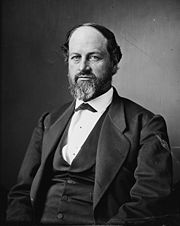
David Perley Lowe
Encyclopedia

Kansas
Kansas is a US state located in the Midwestern United States. It is named after the Kansas River which flows through it, which in turn was named after the Kansa Native American tribe, which inhabited the area. The tribe's name is often said to mean "people of the wind" or "people of the south...
.
He graduated from the Cincinnati Law College
University of Cincinnati College of Law
The University of Cincinnati College of Law is the fourth oldest continually running law school in the United States and a founding member of the Association of American Law Schools. It was started in 1833 as the Cincinnati Law School...
in 1851 and was admitted to the bar and commenced practice in Cincinnati, Ohio
Cincinnati, Ohio
Cincinnati is a city in the U.S. state of Ohio. Cincinnati is the county seat of Hamilton County. Settled in 1788, the city is located to north of the Ohio River at the Ohio-Kentucky border, near Indiana. The population within city limits is 296,943 according to the 2010 census, making it Ohio's...
. He moved to Mound City, Kansas
Mound City, Kansas
Mound City is a city in and the county seat of Linn County, Kansas, United States. As of the 2010 census, the city population was 694.-Geography:Mound City is located at...
in 1861 and continued the practice of law. He was a member of the State senate in 1863 and 1864 and served as a judge of the sixth judicial district 1867-1871. He moved to Fort Scott
Fort Scott
General Winfield Scott, former General-in-Chief of the U.S. Army, was the namesake for five places named Fort Scott:*Fort Scott, Kansas, a city that grew up around a military fort of the same name**Fort Scott National Historic Site...
in 1870 and was elected as a Republican
Republican Party (United States)
The Republican Party is one of the two major contemporary political parties in the United States, along with the Democratic Party. Founded by anti-slavery expansion activists in 1854, it is often called the GOP . The party's platform generally reflects American conservatism in the U.S...
to the Forty-second and Forty-third Congresses (March 4, 1871-March 3, 1875). He was chairman of the Committee on Mines and Mining (Forty-third United States Congress) but declined to be a candidate for renomination in 1874. He was appointed chief justice of Utah Territory
Utah Territory
The Territory of Utah was an organized incorporated territory of the United States that existed from September 9, 1850, until January 4, 1896, when the final extent of the territory was admitted to the Union as the State of Utah....
by President Ulysses S. Grant
Ulysses S. Grant
Ulysses S. Grant was the 18th President of the United States as well as military commander during the Civil War and post-war Reconstruction periods. Under Grant's command, the Union Army defeated the Confederate military and ended the Confederate States of America...
in 1875. He returned to Kansas and settled in Fort Scott, Bourbon County and was again elected judge of the sixth judicial district of Kansas in 1879 and served until his death in Fort Scott, Kansas
Fort Scott, Kansas
Fort Scott is a city in and the county seat of Bourbon County, Kansas, United States, south of Kansas City, on the Marmaton River. As of the 2010 census, the city population was 8,087. It is the home of the Fort Scott National Historic Site and the Fort Scott National...
, April 10, 1882; interment in Evergreen Cemetery.
Perhaps he is best remembered for his support of civil rights
Civil rights
Civil and political rights are a class of rights that protect individuals' freedom from unwarranted infringement by governments and private organizations, and ensure one's ability to participate in the civil and political life of the state without discrimination or repression.Civil rights include...
legislation, quoted by the Supreme Court of the United States
Supreme Court of the United States
The Supreme Court of the United States is the highest court in the United States. It has ultimate appellate jurisdiction over all state and federal courts, and original jurisdiction over a small range of cases...
in 1961 in Monroe v. Pape
Monroe v. Pape
Monroe v. Pape, , was a United States Supreme Court case that considered the application of Federal Civil Rights law to constitutional violations by city employees.- Background :...
, discussing Congressional debate of the 1871 Civil Rights Act
Civil Rights Act of 1871
The Civil Rights Act of 1871, , enacted April 20, 1871, is a federal law in force in the United States. The Act was originally enacted a few years after the American Civil War, along with the 1870 Force Act. One of the chief reasons for its passage was to protect southern blacks from the Ku Klux...
(Ku Klux Klan
Ku Klux Klan
Ku Klux Klan, often abbreviated KKK and informally known as the Klan, is the name of three distinct past and present far-right organizations in the United States, which have advocated extremist reactionary currents such as white supremacy, white nationalism, and anti-immigration, historically...
Act): "While murder is stalking abroad in disguise, while whippings and lynchings and banishments have been visited upon unoffending American citizens, the local administrations have been found inadequate or unwilling to apply the proper corrective. Combinations, darker than the night [which] hides them, conspiracies, wicked as the worst felons could devise, have gone unwhipped of justice. Immunity is given to crime, and the records of the public tribunals are searched in vain for any evidence of effective redress." Monroe v. Pape, 365 U.S. 167, 175 (1961), quoting Cong. Globe, 42nd Cong., 1st Sess., App. 166-167.

